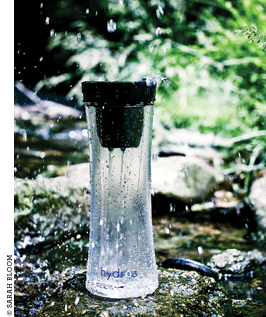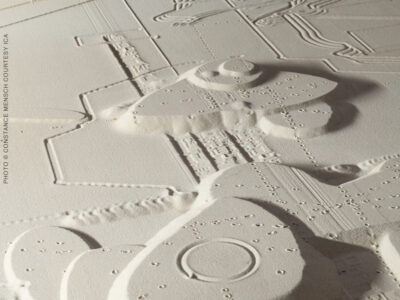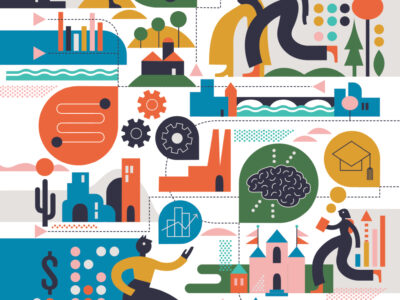
Class of ’09 | The Hydros Bottle, which combines the rugged convenience of a Nalgene bottle with a fast-acting carbon filter, is the brainchild of Aakash Mathur C’09 W’09 and Jay Parekh EAS’09.
“We see Hydros Bottle as a direct substitute for bottled water,” says Mathur. “I had always wanted a water bottle with a built-in filter, but found those on the market either too expensive or too difficult to use. There was nothing designed for common, day-to-day use.” The bottle sells for $30 and is currently available only at hydrosbottle.com.
The pair had considerable help from a Penn-spawned company called Innova Dynamics, whose management team includes Alex Mittal EAS’07 W’07 (CEO), Arjun Srinivas EAS’07 W’07 (COO), and Michael Young C’08 EAS’08 (director of technology development). In addition to a “unique blend of media that allows us to filter water quickly,” Mathur explains that nanotechnology was used “to embed IonArmour, Innova’s triclosan-free antimicrobial enhancement, into the cap of the bottle, killing odor-causing bacteria common to other reusable water bottles.”
The inspiration struck during their senior year at Penn, when Mathur and Parekh were both working independently with Innova on similar projects to adapt their technologies for commercial water-filtration purposes.
“I was working on a business plan through Professor Ian MacMillan’s Societal Wealth Venturing Course to introduce a filtered water bottle across the US and in urban areas of developing countries,” says Parekh. “Jay was exploring the buy-a-bottle-give-a-bottle model through the Dell Social Innovation Competition. The guys at Innova introduced us to each other in April, and we decided to work together on both business plans (the class and the competition). The decision to start the company and try to make an idea reality was taken at 3 a.m. in Huntsman Hall basement as we edged closer to completing the business plan, hours before the Dell Competition deadline.”
The Hydros Bottle, Mathur notes, is “tested to the NSF 42 Standard to reduce chlorine, chloramines, and particulates from water,” improving its taste and quality. (Though they are working on new bottles that will be able to filter unsafe water, the current bottle is designed only for water that is already potable.) The removable filters in the cap last about three months.
Furthermore, through their Operation Hydros project, Mathur and Parekh donate a dollar from every bottle they sell to a joint project with Engineers Without Borders, the first of which is a spring-water distribution project in Cameroon.
“While the ultimate vision is to release a bottle that can address water-quality issues worldwide, we realize it will take time to accomplish this,” says Mathur. “We believe that through Operation Hydros, we can address water-quality issues head-on in rural areas.”
—S.H.




